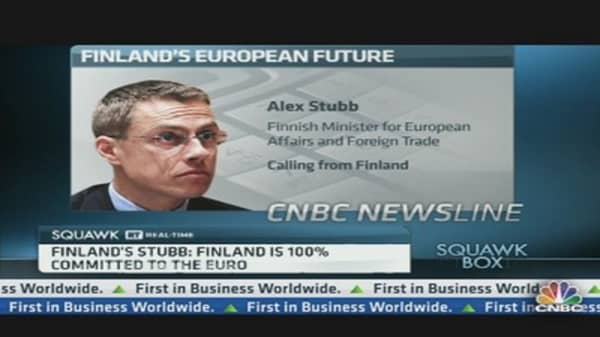Finland is “100 percent” committed to keeping the euro intact and is not looking at any “doomsday scenarios”, Alex Stubb the country’s minister for European affairs and foreign trade told CNBC Friday.
His remarks come after Finnish foreign minister, Erkki Tuomioja, said European leaders must prepare for a euro zone breakup in an interviewwith the UK’s Daily Telegraph newspaper.
“Scenario number one for the Finnish government is that the euro will continue,” Stubb, who is also the former foreign minister, told CNBC.
“We’ll have a stronger euro, a more stable euro and we’ll find tighter rules for the future so that these types of crises never happen again.”
He disagreed with comments made by Tuomioja who said Finnish officials have prepared for the breakup of the euro with an "operational plan for any eventuality."
AAA-rated Finland has a veto that could be used to block new bailout measures. It has also negotiated collateral requirements when the ECB (European Central Bank) lends to Greece and Spain, which makes sure Finland recovers some of its loan funds.
“I don’t think we should be playing with fire here and suggesting the breakup of the euro or detaching some members from the euro zone,” Stubb said.
“I fundamentally disagree with the statements that the breakup of the euro would not necessarily mean the breakup of the EU,” he said, in contrast to Tuomioja who suggested a breakup could make the EU stronger.
Stubb confirmed that Finland is trying its utmost to keep all countries in the euro zone and with the single currency, including Greece.
“I get the feeling that people think that the euro is some kind of an extraterrestrial currency, whereby it has some kind of seventeen strange member states in it,” he said.
“No, it is our currency and the aim is to make it the currency of all EU countries, save those who have an opt out.”
He argued patience in his government is not running out, explaining that fifteen years ago the northern member states, including Germany, had reached a challenging economic situation and that cycle is now happening to some of the southern states.
“I think the alternative course, of not helping out, not giving loans or guarantees, would be way too high,” he said.
He conceded that there is a lack of confidence among member states that needs to be addressed if they are too move forward.
“There is a lack of trust among members states right now, a lack of confidence. We need to rebuild that trust and in order to rebuild that trust,” he said.
“We need tighter rules for the future and I think the collateral requirements, which of course are a footnote in this whole game, is part and parcel of it.”




